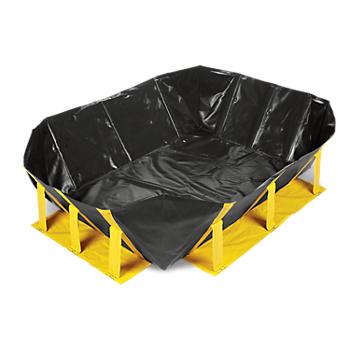
PIG® Collapse-A-Tainer® IBC Containment Berm
IBC300
Write a Review
122cm x 183cm x 58cm, 1476 L Sump Capacity
As Low As £591.14 (Ex. VAT)
IBC containment has never been easier with this lightweight, portable IBC spill containment berm.
Read More
PRICING (Based on quantity)
| 1 - 2 | 3 + |
|---|---|
|
1
- 2 £622.25 (Ex. VAT) |
3
+
£591.14 (Ex. VAT) Best Buy |
| Best Buy |

Description & Specifications
IBC containment has never been easier with this lightweight, portable IBC spill containment berm.
- Helps meet secondary containment regs with a small footprint
- Easy to set up and tear down; lightweight and portable for on-the-go containment of IBCs at job sites
- Sidewalls collapse completely flat for fast and easy forklift access to your IBC
- No assembly required; collapsible sidewalls have attached skirt with outside aluminium-reinforced supports that help the walls stay rigid and upright
- Convenient one-piece design requires no additional parts or tools
- Folds up flat for easy storage and transport
- Can be held in place with sandbags or with stakes through attached grommets
- Constructed of a durable, coated geomembrane that resists chemicals, abrasion and tearing
- Overall floor space required - 188cm W x 246cm L
| Maximum Working Temperature | 65°C (150°F) |
| Colour | Black and Yellow |
| Dimensions | 122cm W x 183cm L x 58cm H |
| Sump Capacity | 1476 L |
| Folded Dimensions | 61cm W x 91cm L x 13cm H Folded |
| Usable Floor Space | 122cm W x 183cm L Floor Space |
| Wall Type | 4 Manual Walls |
| Sold as | 1 each |
| Weight | 22 kg |
| # per Pallet | 19 |
| Composition |
Co-polymer geomembrane - 28 mil. nominal; PVC wall supports and skirt; Aluminium support struts |
| Sump Dimensions | 122cm W x 183cm L x 58cm H |
Optional Accessories for IBC300
Reviews
Based on 0 review(s)
Additional Information
- Chemical Compatibility for PIG® Collapse-A-Tainer® Spill Containment Berm
- Instructions for PIG Collapse-A-Tainer Spill Containment Berm
-
The Control of Pollution (Oil Storage) Regulations (Northern Ireland) 2010
The Regulations apply to above ground oil storage facilities on industrial, commercial and institutional residential sites. They also extend to companies who refine or distribute oil. The Regulations set minimum design standards for new and existing above ground oil storage facilities, codifying existing good practice to ensure that above ground oil storage facilities are adequately constructed. A key requirement of the Regulations is for the storage container to have a secondary containment system (a bund, which is an outer wall or enclosure designed to contain the contents of an inner tank, or, a drip tray) to ensure that any leaking or spilt oil is contained and does not enter the aquatic environment. -
The Control of Pollution (Oil Storage)(England) Regulations 2001
This regulation applies to any container with a storage capacity of over 200 litres, and applies to any industrial, commercial or institutional site, e.g. factories, shops, offices, hotels, schools, public sector buildings and hospitals. All types of oil except waste oil are included. A bund or catchpit has to form a container around the tank capable of holding 110% of the contents of the oil stored or 25% of the total volume, whichever is greater. This is known as secondary containment. -
The Water Environment (Oil Storage) (Scotland) Regulations 2006
This regulation applies to any container with a storage capacity of over 200 litres. It affects all premises, including land and mobile plant, as well as private dwellings. "Oil" means any kind of oil and includes petrol, diesel, waste and vegetable and plant oil, but does not include bitumen. The storage container, whether indoors or outdoors, must be situated within a secondary containment system capable of holding 110% of the contents of the oil store or 25% of the total volume (whichever is greater). -
The Water Resources (Control of Pollution) (Oil Storage) (Wales) Regulations 2016
The Regulations apply to any kind of oil, including petrol, diesel, kerosene, lubricating oil (both mineral and synthetic), waste oil, vegetable and plant oil, and apply to any kind of container which has a capacity of greater than 200 litres which is being used to store oil above ground, whether inside or outside a building. This includes fixed tanks, intermediate bulk containers (IBCs), drums (oil drums or similar containers used for storing oil) or mobile bowsers. The Regulations will come into force in 3 stages - Tanks installed after 15 March 2016 will have to comply with the Regulations from the date they are installed; Existing tanks at significant risk (i.e. facilities that are located within 10 metres of any surface water or wetland, or 50 metres of a borehole or well), will have to comply within 2 years (i.e. by 15 March 2018); Existing tanks not at significant risk will have to comply within 4 years (i.e. by 15 March 2020). The secondary containment system must contain at least 110% of the maximum contents of the oil container, or at least 25% of the total storage capacity if multiple containers are stored, whichever is the greater.














